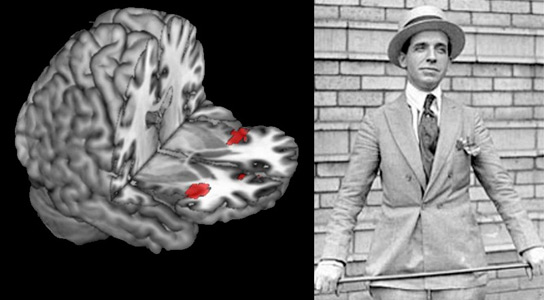
Spotting an untrustworthy face, like that of the legendary fraudster Charles Ponzi (right), may depend on activation in the brain’s anterior insula (left). Credit: (left) UCLA; (right) Wikipedia Commons
Researchers have discovered one of the reasons why it may seem like older people fall victim to financial fraud. Scientists have found out that the human ability to judge trustworthiness of people’s faces diminishes with age.
The scientists published their findings in the journal Proceedings of the National Academy of Sciences. Shelley Taylor, psychologist at the University of California, Los Angeles, and her colleagues examined how people in two age groups perceived the photos of faces that had been pre-rated for trustworthiness and approachability. These faces conveyed well-known cues of trustworthiness, such as a direct gaze and a sincere smile that turns up fully towards the eyes.
Both age groups perceived faces rated as trustworthy or neutral as equally trustworthy and approachable, but the older adults, aged 55 to 84 with a mean age of 69, rated untrustworthy faces as significantly more trustworthy and approachable than the younger adults, aged 20 to 42 mean age of 23.
They missed facial cues that are usually pretty easily distinguished, states Taylor. Most of the older adults showed this effect. A further 44 participants were asked to rate the faces for trustworthiness while undergoing functional magnetic resonance imaging (fMRI).
Young adults showed a strong response in the anterior insula, which is known to control gut feelings that inform decision-making, especially when viewing untrustworthy faces. The older adults didn’t display such activation, suggesting that they were getting diminished or no warning signs.
This is the first time that someone has looked to see if the way older people process social information around trustworthiness makes them more susceptible to fraud. Further work is needed in order to determine if the observed results were caused by age-related changes in the brain or if older adults are simply less motivated to look for social signals of untrustworthiness. This could explain their reduced activity in this brain region. It’s been shown previously that older adults tend to remember more positive than negative information, relative to younger adults.
Reference: “Neural and behavioral bases of age differences in perceptions of trust” by Elizabeth Castle, Naomi I. Eisenberger, Teresa E. Seeman, Wesley G. Moons, Ian A. Boggero, Mark S. Grinblatt and Shelley E. Taylor, 3 December 2012, Proceedings of the National Academy of Sciences.
DOI: 10.1073/pnas.1218518109








Be the first to comment on "Why Older People Are More Susceptible to Fraud"